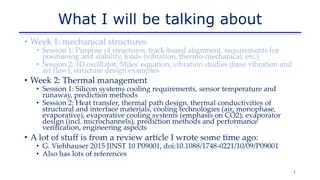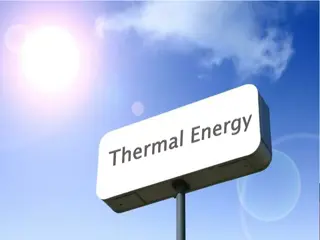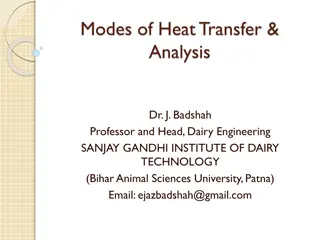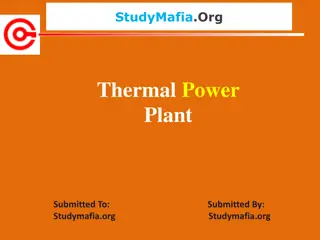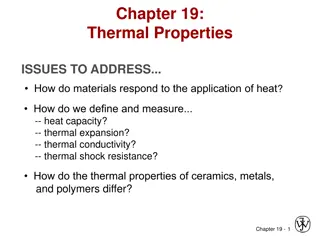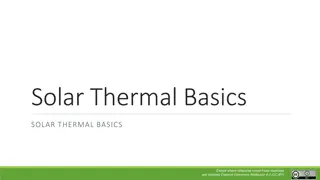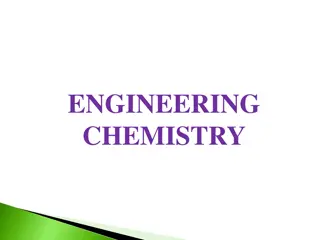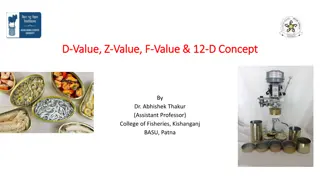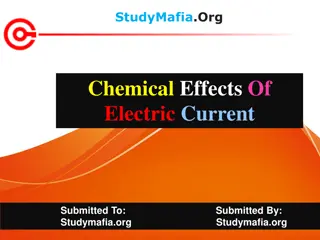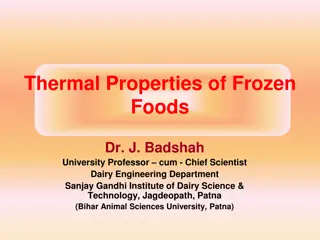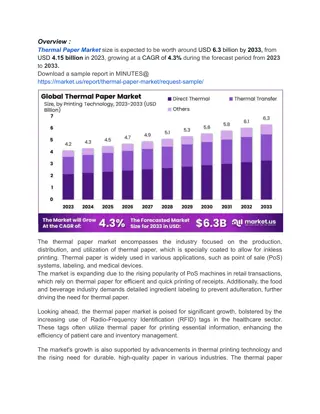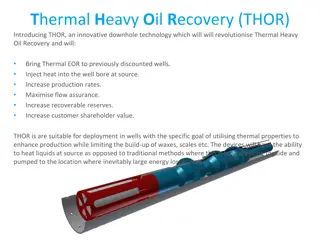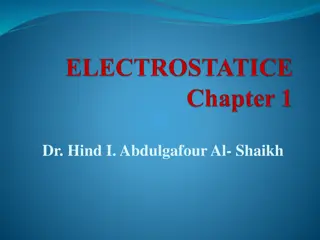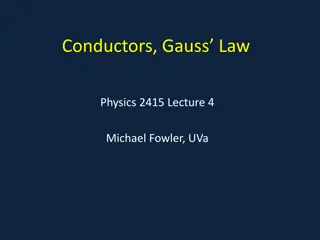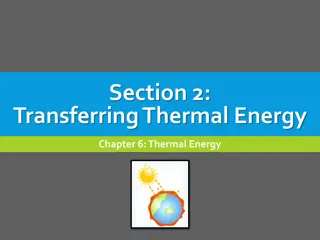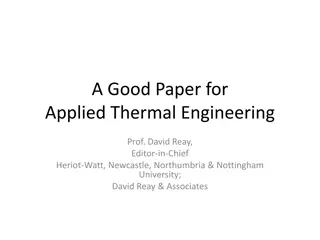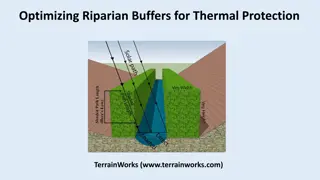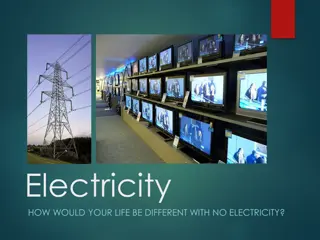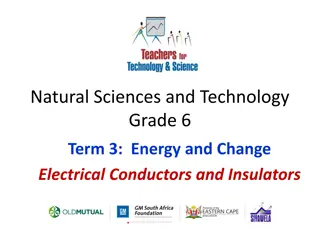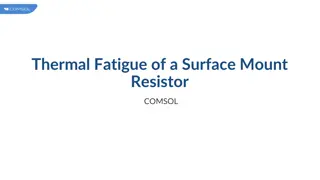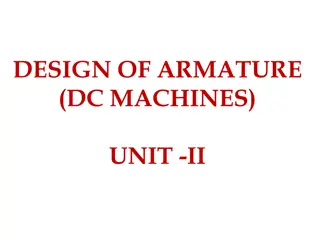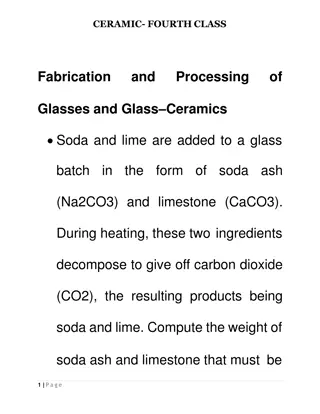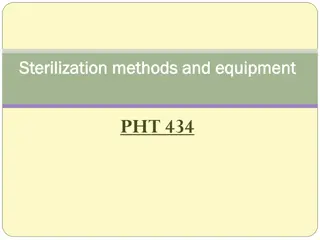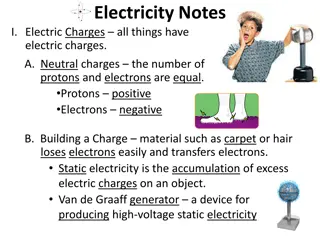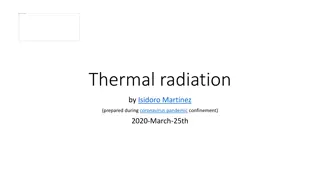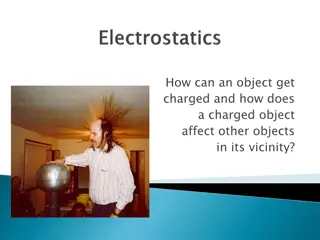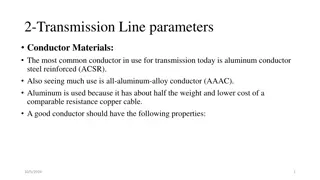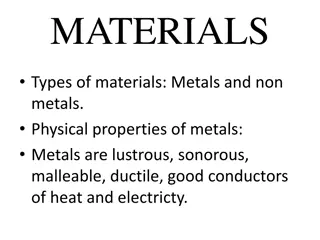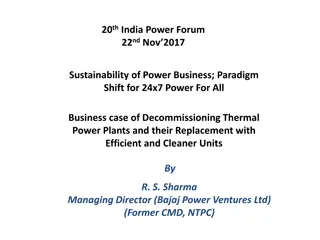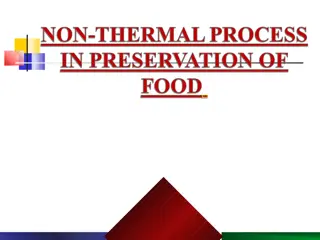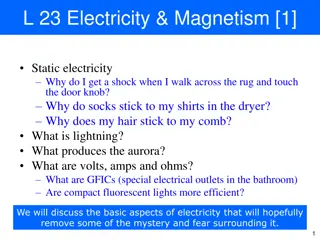Implementation of Utility Thermal Energy Network (UTEN) and Jobs Act Update
The implementation of the Utility Thermal Energy Network (UTEN) and Jobs Act involves a series of events and discussions, including the signing into law, technical conferences, pilot project proposals, and withdrawals. Various utilities have proposed pilot projects targeting different types of custo
3 views • 15 slides
Thermal Management and Mechanical Structures Overview
This content provides detailed information on mechanical structures and thermal management in engineering systems. Topics include the purpose of structures, alignment, stability requirements, thermal loads, vibration studies, heat transfer, cooling technologies, and the importance of effective therm
1 views • 37 slides
Electrical Conductor Ampacity Calculation Scenarios
Various scenarios are presented involving the calculation of allowable ampacity for different types of electrical conductors connected to circuit breakers with temperature limitations. The calculations consider factors like conductor material, size, temperature ratings, and ambient conditions to det
0 views • 140 slides
Understanding Thermal Energy: Transfer & Transformation
Explore thermal energy and its transfer mechanisms such as conduction, convection, and radiation. Learn how thermal energy moves between objects of different temperatures, and why heat is always transferred, not coldness. Enhance your knowledge on the fascinating world of thermal energy dynamics.
0 views • 14 slides
Understanding Heat Transfer: Conduction, Thermal Conductivity, and More
Explore the fundamentals of heat transfer through conduction and thermal conductivity as explained by Dr. J. Badshah. Learn about the modes of heat transfer, Fourier's law, thermal resistance, and the relationship between thermal and electrical conductivity. Discover the essential features of therma
1 views • 9 slides
Understanding Insulators: Properties, Materials, and Testing
An insulator is a crucial device used to support and insulate electric conductors or equipment from ground or other conductors. This article covers the definition, desirable properties, materials used, ratings, and testing methods of insulators, including flashover tests, sample tests, and routine t
1 views • 33 slides
Understanding Thermal Conductors and Insulators in Energy Transfer
Today's lesson focuses on energy transfer, specifically on conductors and insulators. Learn about the characteristics of thermal conductors and insulators, how they affect the flow of thermal energy, and their real-life applications. By the end of this lesson, you will be able to distinguish between
0 views • 13 slides
Understanding Thermal Power Plants: Overview and Operation
Thermal power plants play a crucial role in converting heat energy into electricity for various applications. This article covers the definition, layout, working principle, and components of thermal power plants, highlighting their advantages and top features. From converting heat into mechanical po
0 views • 20 slides
Understanding Thermal Properties of Materials
Materials respond differently to heat based on their thermal properties such as heat capacity, thermal expansion, conductivity, and shock resistance. The ability of materials to absorb heat, expand with temperature changes, and conduct heat varies across ceramics, metals, and polymers. Heat capacity
0 views • 19 slides
Understanding Solar Thermal Technology Basics
This content covers the basics of solar thermal technology, including insolation, passive solar design, and active solar systems for producing hot water. It explains the uses of solar thermal energy in domestic, commercial, and pool heating applications. The efficiency of solar thermal panels compar
1 views • 13 slides
Understanding Electrochemistry in Engineering Chemistry
Electrochemistry in engineering chemistry explores the interactions between electrical and chemical energy, involving the conversion of energy forms. It discusses electrical conductors, insulators, metallic conductors, good conductors, semiconductors, and electrolytic conductors. The concept of elec
4 views • 56 slides
Understanding Bacterial Spore Survival and Thermal Death Rates
Survival of bacterial spores during heat processing is crucial for food safety. The concept of Decimal Reduction Time (D value) and Thermal Death Time (TDT) curve help in understanding the thermal destruction of bacteria or spores. The Z value indicates the change in temperature necessary to cause a
6 views • 14 slides
Understanding Electrical Conductors and Insulators
Electrical conductors like metals allow the flow of charge, while insulators like wood and plastic impede the flow. Copper, silver, and aluminum are examples of good conductors, with high conductivity. Insulators have high resistivity, preventing the easy flow of electric current. Learn about the pr
3 views • 5 slides
Understanding Chemical Effects of Electric Current
The chemical effects of electric current involve reactions in conducting solutions through which an electric current passes. This phenomenon leads to various effects like electroplating, formation of gas bubbles, deposition of metals, and changes in solution color. Conductors play a vital role in al
5 views • 17 slides
Thermal Properties of Frozen Foods: Importance and Modeling Equations
Understanding the thermal properties of frozen foods is crucial for ensuring food safety and quality. Dr. J. Badshah discusses the significance of freezing, reduction of microorganism activity, and the role of thermal properties like density, specific heat, and thermal conductivity. Freezing point d
0 views • 15 slides
Healthcare Sector's Growing Adoption of RFID Tags Boosts Thermal Paper Market
Thermal Paper Market By Printing Technology (Direct Thermal, Thermal Transfer, Others), By Width (2.25\u201d (57mm) and 3.125\u201d (80mm)), By Application (Lottery & Gaming, Point of Sale (PoS), and Tags & Labels), By Region and Companies - Industry
0 views • 4 slides
How to Create Thermal Images from a Thermal Flashlight
Thermal flashlight images can be made using different approaches such as long exposure photography or using light tracking software. This guide provides detailed steps on how to capture thermal images effectively with tips on light tracking apps, long exposure techniques, and imaging locations for o
0 views • 8 slides
Revolutionary Downhole Technology for Thermal Heavy Oil Recovery (THOR)
THOR is an innovative downhole technology that aims to revolutionize Thermal Heavy Oil Recovery by bringing Thermal EOR to previously discounted wells, increasing production rates, maximizing flow assurance, and enhancing recoverable reserves. THOR's key benefits include flexible power options, safe
1 views • 6 slides
Understanding Electric Charges and Conductors in Physics
Explore the fundamentals of electrostatics, electric charges, conductors, and insulators in physics. Learn about the Law of Electric Charges, types of charge, conductors vs. insulators, and methods of charging objects through friction, conduction, and induction. Dive into the world of atoms, electro
1 views • 14 slides
Understanding the Hall Effect in Conductors
The Hall Effect in conductors is described in detail, showcasing how a magnetic field affects the conductivity tensor, breaking symmetry and leading to unique properties. The discussion covers the separation of the conductivity tensor, the impact of magnetic fields on conductivity components, and th
1 views • 16 slides
Insights on Conductors and Gauss Law in Physics
Explore electric fields in and near conductors, understand Gauss Law, and delve into the behavior of electrons inside a conductor. Discover why there can be no electric field inside a conductor in electrostatics and learn about the distribution of charges on a conductor's surface. Consider scenarios
4 views • 19 slides
Understanding Thermal Energy Transfer Methods
Explore the three primary ways thermal energy is transferred - conduction, convection, and radiation. Dive into the characteristics of good conductors, such as metals, and how they facilitate heat transfer. Learn about the role of insulators in controlling thermal energy flow and discover the best h
1 views • 24 slides
Insights into the Editorial Process of Applied Thermal Engineering Journal
Applied Thermal Engineering journal, under the leadership of Editor-in-Chief Prof. David Reay, has a rich history dating back to 1981. The journal's evolution, from its origins as Heat Recovery Systems to its current name and scope, reflects its commitment to advancing thermal engineering knowledge.
0 views • 29 slides
Optimizing Riparian Buffers for Thermal Protection in Teanaway River Watershed
Explore the study comparing optimized riparian buffer designs with fixed-width buffers in non-fish bearing streams of the Teanaway River watershed, focusing on maximizing thermal energy reductions with considerations for channel orientation and forest density. By utilizing NetMaps and thermal energy
0 views • 24 slides
Understanding Electricity: Conductors, Insulators, and Current
Electricity is essential for modern life, with conductors allowing electron flow and insulators preventing it. Learn about the basics of atoms, electrons, and how electricity works through conductors and insulators. Discover the role of current and how electrons behave in different materials, drawin
0 views • 19 slides
Methods of Solving Electrostatics Problems in Conductor Systems
Understanding problem-solving methods in electrostatics, including the use of images and fictitious point charges to analyze interactions between conductors and charges. Exploring scenarios with semi-infinite and finite conductors, grounded and insulated spheres, and the concept of equipotential sur
0 views • 36 slides
Understanding Electrical Conductors and Insulators in Grade 6 Natural Sciences and Technology
Explore the topic of electrical conductors and insulators in Grade 6 Natural Sciences and Technology, learning about wiring a three-pin plug, the colors of the live, neutral, and earth wires, and the steps involved in wiring a South African three-pin plug. Gain insight into the roles of each wire an
0 views • 14 slides
Thermal Shock Testing of Gel-Bonded Magnesia Refractories
Study conducted by Paul Bosomworth at Leeds University in 1986 aimed to reduce mechanical damage after thermal shock in magnesia refractories used in sliding gates. The research focused on using gel-binders and achieving optimum grain packing to enhance thermal stress damage resistance. The study al
0 views • 7 slides
Thermal Fatigue of a Surface Mount Resistor: A COMSOL Analysis
A COMSOL analysis is conducted on the thermal fatigue of a surface mount resistor subjected to thermal cycling. The study focuses on the solder joint, structural integrity, and life prediction using fatigue models. Various aspects of the resistor assembly, including material composition, dimensions,
0 views • 13 slides
Understanding the Design and Elements of Armature in DC Machines
The design of armature in DC machines involves various factors such as armature windings, number of conductors, coils, slots, voltage drop, peripheral speed, and more. Armature winding arrangements play a crucial role in producing electromotive forces through relative motion in a magnetic field. Com
0 views • 27 slides
Ceramic Fourth Class: Glass and Ceramic Fabrication and Processing Overview
The Ceramic Fourth Class covers topics such as glass and glass ceramic fabrication, composition calculations, thermal properties of different glasses, introduction of thermal stresses in glass pieces, resistance to thermal shock, thermal tempering processes, clay mineral characteristics, whiteware c
0 views • 10 slides
Understanding Sterilization Methods and Equipment for Pharmaceutical Products
Sterilization is crucial in the production of sterile pharmaceuticals, involving the removal or destruction of microorganisms to ensure product safety. Methods include physical (moist heat, dry heat, irradiation), chemical (gaseous, liquid sterilants), and non-thermal techniques like ethylene oxide
0 views • 35 slides
Understanding Electricity: Charges, Conductors, Insulators, and Storms
Explore the fundamentals of electricity, including electric charges, neutral charges, static electricity, conductors, insulators, lightning storms, and the phenomenon of lightning strikes. Learn about the laws of conservation of charge, electric fields, and the properties of conductive and insulatin
0 views • 23 slides
Understanding Thermal Radiation and its Effects
Thermal radiation, studied by Isidoro Martínez during the COVID-19 pandemic, explores the transfer of heat through conduction, convection, and radiation. It delves into the concept of thermal effects of radiation, blackbody radiation, and related laws like Planck's law, Stefan-Boltzmann's law, and
0 views • 23 slides
Understanding Electric Charge and Interactions Between Objects
Matter is composed of neutrons, protons, and electrons with different charges. Being charged means having an excess or shortage of charge. Grounding, insulators, conductors, and methods of charging play important roles in how objects get charged. By contacting charged objects with objects that can g
0 views • 33 slides
Types of Conductors in Transmission Lines
Aluminum conductors, such as AAC, AAAC, ACSR, and ACAR, are commonly used in transmission lines due to their high conductivity, tensile strength, light weight, and resistance to corrosion. AAC is known for its good conductivity but limited strength, while AAAC offers better mechanical strength and c
0 views • 17 slides
Physical and Chemical Properties of Metals and Non-metals
Metals exhibit physical properties like lustrous appearance, ductility, malleability, and sound production. They are also good conductors of heat and electricity. Non-metals, on the other hand, are brittle, non-sonorous, and poor conductors of heat and electricity. The chemical properties include re
0 views • 13 slides
Discussion on Sustainable Energy Solutions and Efficiency Improvements in Thermal Power Plants
The 20th India Power Forum held on 22nd November 2017 highlighted the importance of sustainability in the power business, focusing on the paradigm shift towards 24x7 power for all. Topics included decommissioning thermal power plants for more efficient and cleaner units, with insights from industry
0 views • 16 slides
Innovations in Non-Thermal Food Processing Techniques
Non-thermal processing methods have emerged as a solution to the limitations of thermal food processing, offering benefits such as better retention of volatile compounds, nutrients, and flavors. This article explores various non-thermal techniques like Ohmic Heating, Microwave Heating, Pulsed Electr
0 views • 16 slides
Understanding Electricity: From Static Shocks to Conductors
Delve into the world of electricity, demystifying phenomena like static shocks, sticky socks in dryers, and the science behind lightning and auroras. Explore the properties of charge in atoms, electric forces, Coulomb's Law, conductors vs. non-conductors, and more. Gain insights into volts, amps, oh
0 views • 22 slides

